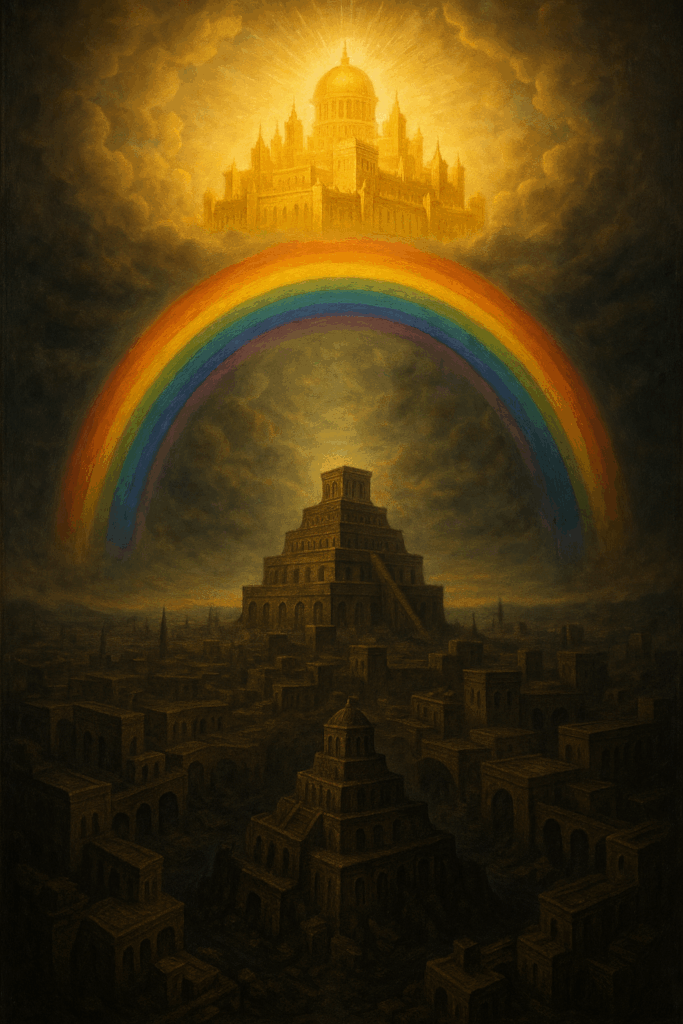Will the City of Zurich become the Whore of Babylon? – The Golden Illusion of our Times
Will the city of Zurich become the Whore of Babylon? Since the dawn of humanity, an ancient pattern has repeated itself: humankind seeks the divine—and in doing so, creates itself. What was once born of love becomes ideology; what began as a covenant ends as a system. Thus arises the image of the "Whore of Babylon": not as a woman of flesh, but as a spiritual symbol for the soul that has forgotten its origin. She represents the spirit of the age, which calls everything holy
except the holy itself.
Babylon is the city of excess, the ideology of self-deification, the religion of humankind without God. Yet, amidst this splendor, revelation calls for repentance: not to condemn, but to redeem.
For where the whore falls, the bride rises. And from the downfall of falsehood comes the birth of truth.
The Name on Her Forehead
And on her forehead was written a name: Mystery, Babylon the Great, the mother of whores and abominations of the earth. — Revelation 17:5
Babylon is not a place, but a spirit. It represents the state of the soul that has become detached from its divine source and elevated creation above the Creator. It is the mother of all ideologies because it enacts the first break: replacing the sacred within itself. Its gold is brilliance without light, its freedom is division. It offers the nations a wine that tastes of progress but numbs.
The Meaning of the Prostitute – Symbol and Mirror of the Soul
The “prostitute” is the emblem of the alienated soul. It abandons the covenant with the Eternal and sells the sacred to secure itself. In biblical terms, fornication is spiritual infidelity: the mixing of light and shadow, the confusion of love and lust, of truth and power.
It is the mother of all false bonds—not as a person, but as an ideology: the principle that permeates everything that separates itself from the divine order. Yet even in the fall, the longing for return remains. For even the alienated soul carries memory:
of the beginning, of the light that left it.
The Woman and the Beast
And I saw a woman sitting on a scarlet beast, full of blasphemous names. — Revelation 17:3
The beast is power without spirit. The woman is the soul that sanctifies this power. She seeks refuge within the system because she no longer knows her origin. Thus, power merges with politics and outward appearances. What appears holy is merely a disguise for self-will. The beast carries her, yet she guides it—and both serve the same goal: the elevation of humanity above God.
Lilith—The First Rebellion
According to ancient tradition, Lilith was Adam's first companion. She was created equal, yet she did not want to serve, but rather to be independent. When she left the garden, she also left the blessing. She became a wanderer, a soul without a home. In her is reflected the archetype of separation: freedom without surrender, power without humility.
Lilith is the archetype of the fallen feminine—not evil, but alienated. She represents the principle that seeks self-sufficiency and in doing so loses its own source.
Yet even within her dwells the longing for return. For no creature can forget where it comes from. When Lilith weeps, Babylon begins to fall.
The City of Abundance
For her sins have reached to heaven. — Revelation 18:5
Babylon is the city of splendor and excess. Everything there is permitted, and therefore nothing is holy anymore. It sells what is priceless: truth, grace, love, and faithfulness. Under the name of freedom, dependency reigns. Under the sign of progress, the soul loses its sense of proportion. The sacred becomes a commodity, the good a stage, the self an idol.
Thus, abundance is transformed into emptiness, and the light of reason becomes the fire of self-worship.
The False Rainbow
They say: Peace, peace!—and there is no peace. — Jeremiah 6:14
In Babylon, every symbol is distorted. The rainbow—once God's covenant—becomes the emblem of humankind. What once signified divine faithfulness becomes a symbol of self-will. Thus, a religion of emotions arises: grace without truth, love without sacrifice, freedom without form.
Yet the light that God placed in the clouds remains inviolable. It serves as a reminder
that the divine order is eternal, even when humanity forgets it.
The Principle of Babylon
Babylon is not a country, but an attitude. It lives in every culture that seeks salvation without God. It is the mother of all spiritual systems that desire good but act without a source. It speaks of love, but it means self-realization. It speaks of truth, but it tolerates none. It speaks of justice, but it judges without mercy.
Everything born from it carries the seed of destruction within it—for without spirit, there is no life.
The City as a Mirror – Zurich and the Legacy of Babylon
Every era has its Babylon, and every city can become its reflection. Not out of malice, but from forgetfulness. When humanity loses its sense of stillness, when the heavens no longer provide direction, the city grows outward, but no longer in depth. Thus, the earthly is transformed into splendor, and splendor becomes an idol.
Zurich—like many cities in the Western world—bears the hallmarks of this new Babylon: wealth without meaning, security without soul, prosperity without origin. Everything is possible, but nothing is sacred.
The facades gleam, but within, the spirit starves. There is talk of sustainability, yet humanity itself is consumed. People seek peace, but no longer prayer. Even the most sacred thing, the relationship between parent and child, is divided into functions.
Where family no longer understands itself as a spiritual cell, but as an organizational unit, life is outsourced—including love. The child is managed, no longer nurtured; the soul is cared for, but no longer guided.
This city is not an enemy, but a mirror. It shows how close Babylon is to us—not in politics, but in our hearts. For where God becomes mere feeling and truth becomes mere opinion, there Babylon rises—even within us.
The Mother Who Devours Her Children
Babylon is a mother without a soul. She gives birth, yet she does not nurture. Her children are ideas, movements, systems—and she consumes them all. What began as liberation ends as coercion. What appeared as love becomes control. What emerged as light becomes darkness.
Because she has no origin, she must sustain herself. She seeks refuge outside herself and offers herself to the world—not out of pride, but out of abandonment. Her body becomes a marketplace because her spirit is uprooted. She calls it freedom, but it is loss. She calls it self-determination, but it is loneliness.
Thus she devours her children—not out of malice, but out of emptiness. For that which does not live from truth consumes itself.
The Judgment
Woe, woe, great city, for in one hour she shall be laid waste! — Revelation 18:19
The judgment on Babylon is not punishment, but revelation. When light enters, the illusion fades. When truth appears, deception falls. Ideology shatters against reality. The divine reclaims what is rightfully itss.
Yet the judgment is healing: It takes away what is empty to make room for truth.
The Bride of the Lamb
Rejoice over her, O heavens, and you saints and apostles and prophets! — Revelation 18:20
After the fall of the great city, the new Jerusalem arises, the Bride of the Lamb. She is the healed soul that surrenders itself once more. Her adornment is humility, her radiance is truth. She receives the light, and the light dwells in her.
Where Babylon ends, the Bride begins. Where temptation dies, surrender awakens. Where ideology crumbles, grace enters. And the voice from heaven calls:
Come out, my people, so that you do not share in their sins. (Revelation 18:4)
And I saw the holy city, the new Jerusalem, coming down out of heaven from God, prepared as a bride adorned for her bridegroom. — Revelation 21:2

